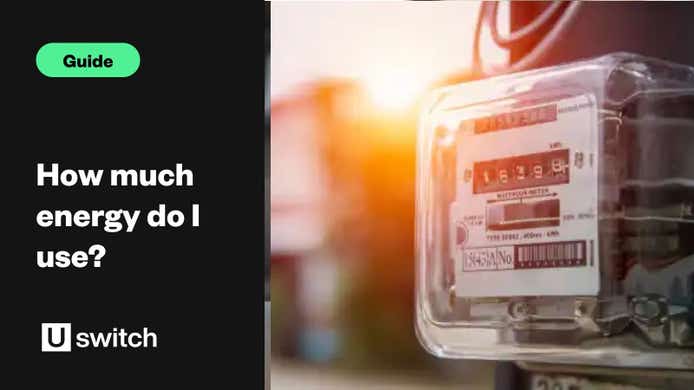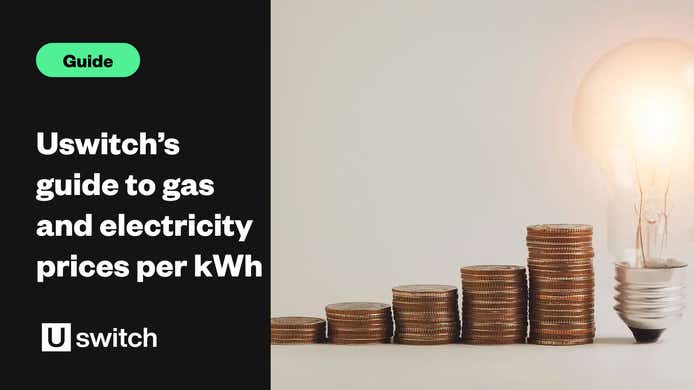It’s worth knowing what the average energy bill looks like for two reasons:
- So you can see how your bills and usage compare to the average
- So you have a better understanding of the way “average” is used in connection with the energy price cap, which is usually reported as the annual energy cost for “average use” households.
The average bill will change each year depending on market factors, the level of the energy price cap and potential government intervention (like the Energy Price Guarantee).
What are the average energy unit rates and standing charges in the UK?
For the price cap that runs from 1 July to 30 September 2025, the average unit rates and standing charges are:
| Electricity | Gas | |
|---|---|---|
| Unit rates | 25.73p per kWh | 6.33p per kWh |
| Standing charge | 51.37p per day | 29.82p per day |
Average electricity bills in the UK
The average electricity bill in the UK as of July 2025 is £729.81 per year (without factoring in the annual electricity standing charge).
Because gas is heavily used in the production of electricity, the cost of buying the gas means it costs more to produce the electricity, and those costs are then passed on to customers. Electricity bills had been falling, but this new price cap is an increase.
Average gas bills in the UK
The average gas bill in the UK as of July 2025 is £803.85 per year (without factoring in the annual gas standing charge).
Gas prices in the UK have been affected by various market factors - such as the Russia-Ukraine war - that have also had a significant impact on the energy prices of other European countries.
Average energy bills by house size
Ofgem usually publishes annual estimates of average energy usage by house size, which can then be extrapolated to find the average energy bills by house size.
| Number of bedrooms | Gas usage (kWh) | Electricity usage (kWh) | Estimated average annual dual fuel energy bill | Estimated average monthly dual fuel energy bill | |
|---|---|---|---|---|---|
| Low | 1-2 | 7,500 | 1,800 | £1,234.23 | £102.85 |
| Medium | 3-4 | 11,500 | 2,700 | £1,719 | £143.25 |
| High | 5+ | 17,000 | 4,100 | £2,427.37 | £202.28 |
Estimated bill calculated by multiplying the kWh usage by the current average unit rates and adding current average standing charges:
- 6.33p per kWh for gas
- 29.82p per day for gas standing charge (£108.84 per year)
- 25.73p per kWh for electricity
- 51.37p per day for electricity standing charge (£187.50 per year)
You can see here how the annual usage for a “medium” household comes to £1,719 - the figure used as an illustration by Ofgem, the government and the media when reporting on the energy price cap.
How is the average gas and electricity bill set?
When we talk about average gas and electricity bills, we’re usually talking about the price of standard variable tariffs.
The average gas and electricity bill for those on standard variable tariffs is affected almost entirely by the level of the energy price cap, which is set by Ofgem according to wholesale market prices. It limits the price that suppliers can charge per unit rate of gas and electricity. If wholesale prices rise, so does the cap.
There are two levels that affect average gas and electricity bills in the UK, then: wholesale market prices, and then Ofgem's reaction via the price cap. But the average bill is only average if that’s the amount of energy you use - if you use more or less, your bill will be higher or lower than the average.
What influences my energy costs?
Everyone uses different amounts of energy depending on their lifestyle and circumstances. For example, a large home with a family living in it is likely to use more energy than a small flat with one occupant because there is more space to heat and more rooms to light. A home that is well-insulated will use less energy than one where the insulation needs to be updated, as will a home with energy-efficient appliances.
Ultimately, being aware of how you use energy and how energy-efficient your home is will have a big impact on your energy costs because you'll be able to see where you might be able to use less energy and save money.
How do seasonal changes impact gas and electricity bills throughout the year?
The amount we pay for energy changes as our energy usage changes throughout the year (though we may continue to pay the same Direct Debit amount until our supplier decides to update it).
In the summer, we tend to use less energy because it's lighter for longer so we don't need to turn on the lights, and warmer so we don't use heating. In the winter, the opposite is true, so we usually use more energy and spend more on our bills as a result.
How do regional variations affect average gas and electricity bills across different parts of the UK?
Average energy bills can differ across different areas of the UK. Regional price changes are affected by:
- The number of customers the energy company has in your area
- The amount of energy the supplier buys from generators in your area
- The different charges imposed on the energy supplier by your area's distribution network
- The level of energy usage by customers in your area.
Find out more in our regional energy prices guide.
How can I reduce my home energy costs?
Energy customers can reduce their home energy costs by reducing their energy usage wherever possible. For instance, you can invest in energy-efficient appliances and make sure your home is well-insulated.
One of the key ways you can manage your energy use more effectively is to use Uswitch’s free mobile app. It connects to your smart meter, tracks energy use throughout your home and uses that information to provide you with personalised energy advice and opportunities to reduce the amount of energy you use. Smart meter statistics reveal a 95.5% accuracy when it comes to reporting your domestic energy consumption, meaning you'll only be charged for the energy you use while reducing the likelihood of human error when reporting energy usage.
There are also 104 energy-saving tips that Uswitch has compiled for every area of the home and every budget that may inspire some opportunities as far as your home’s energy efficiency is concerned.
What if I'm struggling with my energy bills?
If you're struggling with your bills, there is support available (though you may not necessarily qualify for it). The first thing to do is contact your supplier to see how it can help. Together, you can either come up with a payment plan or, in extreme cases, there might be a fund designed to help those most in need with their energy bills.
There is no widespread government support this winter, but there are the usual schemes (Warm Home Discount, Winter Fuel Payment and Cold Weather Payment) in addition to local authority and council funding that can be used to help those who need it most. There is also help available from charities and similar organisations.




